2022届高考英语二轮复习:动作动词和状态动词课件-(15张)
文档属性
| 名称 | 2022届高考英语二轮复习:动作动词和状态动词课件-(15张) |  | |
| 格式 | pptx | ||
| 文件大小 | 2.3MB | ||
| 资源类型 | 教案 | ||
| 版本资源 | 通用版 | ||
| 科目 | 英语 | ||
| 更新时间 | 2022-06-04 20:43:34 | ||
图片预览

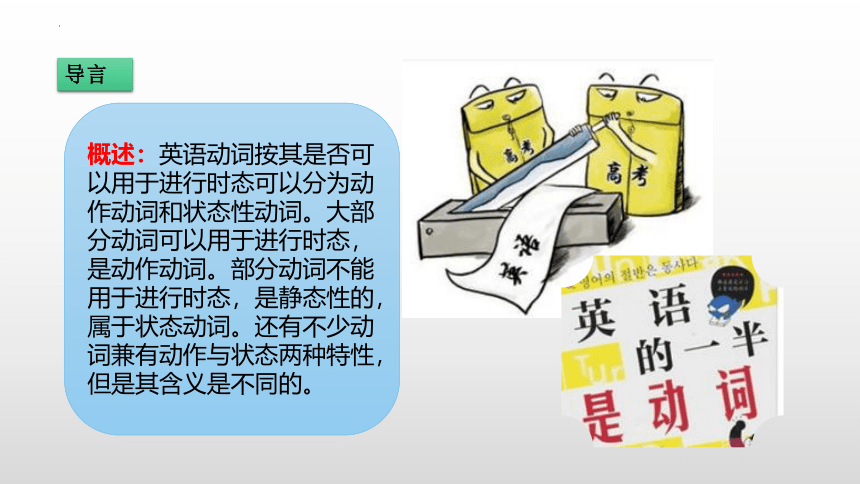
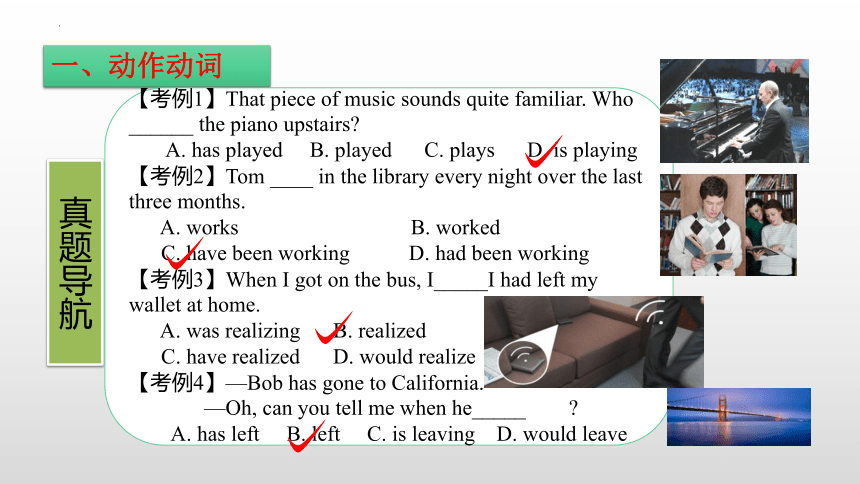
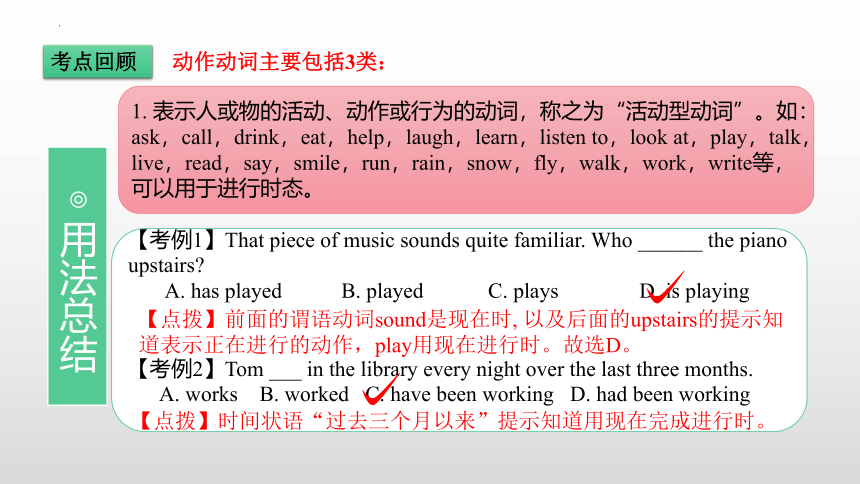
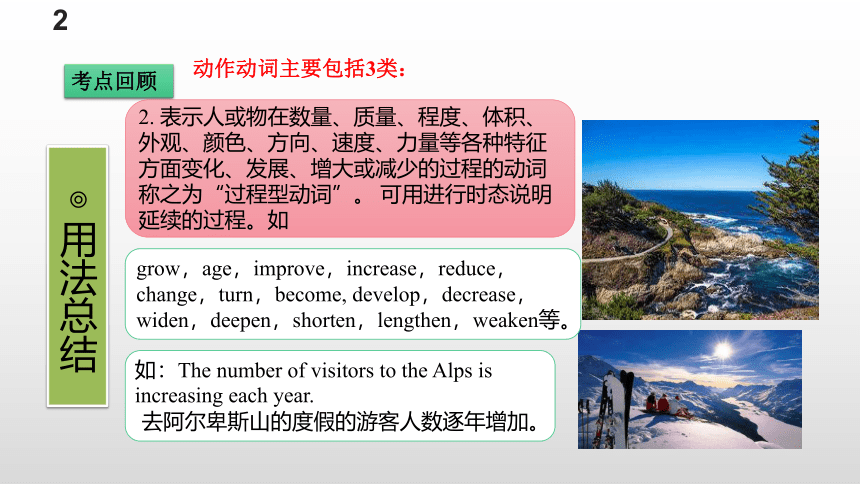

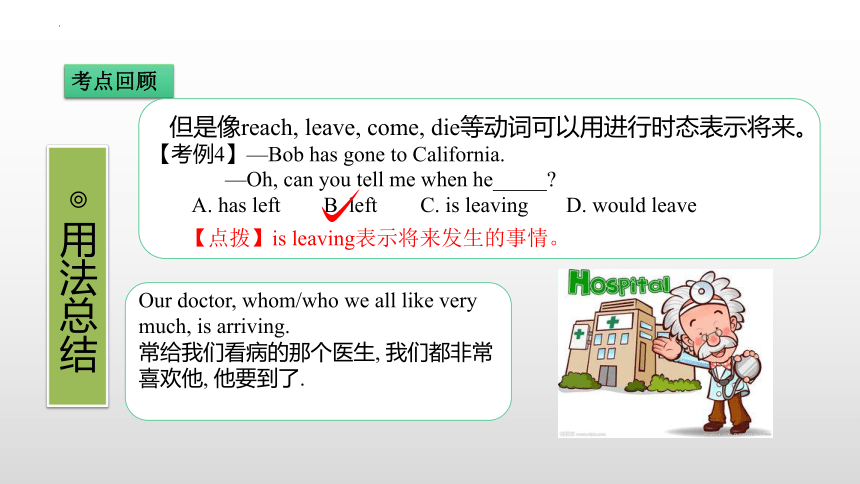
文档简介
(共15张PPT)
全方位解读动词的动作动词和状态动词
导言
概述:英语动词按其是否可以用于进行时态可以分为动作动词和状态性动词。大部分动词可以用于进行时态,是动作动词。部分动词不能用于进行时态,是静态性的,属于状态动词。还有不少动词兼有动作与状态两种特性,但是其含义是不同的。
一、动作动词
【考例1】That piece of music sounds quite familiar. Who ______ the piano upstairs
A. has played B. played C. plays D. is playing
【考例2】Tom ____ in the library every night over the last three months.
A. works B. worked
C. have been working D. had been working
【考例3】When I got on the bus, I_____I had left my wallet at home.
A. was realizing B. realized
C. have realized D. would realize
【考例4】—Bob has gone to California.
—Oh, can you tell me when he_____
A. has left B. left C. is leaving D. would leave
真题导航
考点回顾
◎用法总结
1. 表示人或物的活动、动作或行为的动词,称之为“活动型动词”。如:ask,call,drink,eat,help,laugh,learn,listen to,look at,play,talk,live,read,say,smile,run,rain,snow,fly,walk,work,write等,可以用于进行时态。
【考例1】That piece of music sounds quite familiar. Who ______ the piano upstairs
A. has played B. played C. plays D. is playing
【考例2】Tom ___ in the library every night over the last three months.
A. works B. worked C. have been working D. had been working
动作动词主要包括3类:
【点拨】前面的谓语动词sound是现在时, 以及后面的upstairs的提示知道表示正在进行的动作,play用现在进行时。故选D。
【点拨】时间状语“过去三个月以来”提示知道用现在完成进行时。
2
考点回顾
2. 表示人或物在数量、质量、程度、体积、外观、颜色、方向、速度、力量等各种特征方面变化、发展、增大或减少的过程的动词称之为“过程型动词”。 可用进行时态说明延续的过程。如
如:The number of visitors to the Alps is increasing each year.
去阿尔卑斯山的度假的游客人数逐年增加。
◎用法总结
grow,age,improve,increase,reduce, change,turn,become, develop,decrease, widen,deepen,shorten,lengthen,weaken等。
动作动词主要包括3类:
考点回顾
3. 有些动作从“开始发生”到 “结束/终止”几乎同时或在极短的时间里就完成了“开始—结束”的过程,强调结果,这样的动词称之为“瞬间动词/短暂动词”。hit“击中”,close,open, leave, arrive, reach, buy, lend, borrow, receive, accept, die,join, realize, hear, see等。这类动词通常不用于进行时态,也不可以在完成时中与一段时间状语连用。
A: I have borrowed the book for two weeks.
B: I have had/ kept it for two weeks.
C: It's 2 weeks since I borrowed it.
D: I borrowed it 2 weeks ago.
◎用法总结
×
【考例3】When I got on the bus, I_____I had left my wallet at home.
A. was realizing B. realized C. have realized D. would realize
【点拨】realize“认识到”,表结果,瞬间动词,不用进行时态,排除A。时间状语从句知道过去发生的事实,一般现在时,选B。
T or F
考点回顾
但是像reach, leave, come, die等动词可以用进行时态表示将来。
【考例4】—Bob has gone to California.
—Oh, can you tell me when he_____
A. has left B. left C. is leaving D. would leave
Our doctor, whom/who we all like very much, is arriving.
常给我们看病的那个医生, 我们都非常喜欢他, 他要到了.
◎用法总结
【点拨】is leaving表示将来发生的事情。
二、状态动词
◎真题导航
【考例1】Why not put the meat in the fridge?It will _______ fresh for several days.
A. be stayed B. stay
C. be staying D. have stayed
【考例2】 The palace caught fire three times in the last century, and little of the original building _______now.
A. remains B. is remained
C. is remaining D. has been remained
真题导航
考点回顾
如think,believe,know,consider,hope,want,mean,forget,remember,expect,understand,hate,regret,envy“羡慕”, admire“钦佩”,suppose,fear,mind,notice,prefer,care,like等。如:
如have,contain,belong,consist of,concern,involve,differ,exist,hold,cost,fit,matter,compare,measure,weigh, belong,equal,own,possess,等。如:
◎用法总结
状态动词是表示一种相对静止的动词,不用于进行时态,主要包括3类:
1. 表示心理状态的动词:
Forget it, and move on to tomorrow. 不要再想它了,关心明天的事儿吧!
2. 表示各种关系的动词:
This suit fits him well except that the trousers are too long.
这套西装他穿上很合身,只是裤子太长了。
A tree-piece suit consists of trousers, jacket and waistcoat.
三件套西装包括裤子、上衣和背心。
考点回顾
如be(是), look(看起来), feel(摸上去), seem(似乎是), appear(似乎、显得), prove(证明是), smell(闻起来), taste(尝起来), sound(听起来)等。表示某种情况或状态的持续的连系动词,常见的有: remain(依然), keep(保持),stay(保持),continue(继续、仍旧), stand(处于某状况或情形)等。例如:
My instructions seem simple enough. Do I have to spell them out again
我的要求算是够明白的了---还要我再讲清楚吗
The soldier stood still except that his lips moved now and then.
那个士兵站着一动不动,除了嘴唇在动。
◎用法总结
3. 表示存在或具有某种特征或状态的连系动词
三、兼做状态动词和动作动词
【考例】—Is there anything wrong, Bob You look sad.
—Oh, nothing much. In fact, I ____ of my friends back home.
A. have just thought B. was just thinking
C. would just think D. will just be thinking
状态动词与动作动词之间有时是相通的。有些状态动词亦可用作动作动词,但是二者所表示的意义不同。如:
真题导航
He has two elder brothers and a younger sister.他有两个哥哥和一个妹妹。(状态)
He is having his breakfast .
他在吃早饭。(动作)
◎用法总结
Take hold of the my hand!
The classroom can hold 50 students.
She is condidered to be the best student.
She is considering to leave for New York.
She is looking at a flying bird in the sky and she looks happy.
5
巩固练习
【牛刀小试 】
根据汉语提示,用后面括号内所给的单词完成下列句子。
1. ___________________________(我喜欢安静的乡村) the noisy cities. (prefer)
2. The dogs ___________________(在到处嗅); perhaps they smelt the thief. (smell)
3. __________________________________________(如果你认为自己就是我们要找的人), write to Mr. J. Solomon at our Head Office. (think, look)
4. ______________________________(我房间正举行派对). Can we have three more cups (have)
5. I think you’re old enough ______________________________________ (可以了解我要跟你分享的事了). (understand)
I prefer the quiet countryside to
were smelling round
If you think you are the person we are looking for
We are having a party in my room
to understand what I am going to share with you
考点回顾
6. _______________(听起来很有趣)! Do you usually _____________ (在周末看电影) (sound, see)
7. The spacious parking area can_____________________________ (可容纳200余辆轿车停放). (hold)
8. Blowing your nose in public, and especially at the table, ______________________________ (被认为是一种坏习惯).(consider)
9. Henry ___________________________(觉得这工作并不危险) if he is careful and stay calm. (feel)
10. However, _________________________________ (形势在迅速发展) and our work must keep pace with it. (develop)
◎用法总结
Sounds interesting
see films on weekends
hold more than 200 cars to park
is considered to be a bad manner(habit)
feels that this job isn't dangerous
the situation is developing very rapidly
全方位解读动词的动作动词和状态动词
导言
概述:英语动词按其是否可以用于进行时态可以分为动作动词和状态性动词。大部分动词可以用于进行时态,是动作动词。部分动词不能用于进行时态,是静态性的,属于状态动词。还有不少动词兼有动作与状态两种特性,但是其含义是不同的。
一、动作动词
【考例1】That piece of music sounds quite familiar. Who ______ the piano upstairs
A. has played B. played C. plays D. is playing
【考例2】Tom ____ in the library every night over the last three months.
A. works B. worked
C. have been working D. had been working
【考例3】When I got on the bus, I_____I had left my wallet at home.
A. was realizing B. realized
C. have realized D. would realize
【考例4】—Bob has gone to California.
—Oh, can you tell me when he_____
A. has left B. left C. is leaving D. would leave
真题导航
考点回顾
◎用法总结
1. 表示人或物的活动、动作或行为的动词,称之为“活动型动词”。如:ask,call,drink,eat,help,laugh,learn,listen to,look at,play,talk,live,read,say,smile,run,rain,snow,fly,walk,work,write等,可以用于进行时态。
【考例1】That piece of music sounds quite familiar. Who ______ the piano upstairs
A. has played B. played C. plays D. is playing
【考例2】Tom ___ in the library every night over the last three months.
A. works B. worked C. have been working D. had been working
动作动词主要包括3类:
【点拨】前面的谓语动词sound是现在时, 以及后面的upstairs的提示知道表示正在进行的动作,play用现在进行时。故选D。
【点拨】时间状语“过去三个月以来”提示知道用现在完成进行时。
2
考点回顾
2. 表示人或物在数量、质量、程度、体积、外观、颜色、方向、速度、力量等各种特征方面变化、发展、增大或减少的过程的动词称之为“过程型动词”。 可用进行时态说明延续的过程。如
如:The number of visitors to the Alps is increasing each year.
去阿尔卑斯山的度假的游客人数逐年增加。
◎用法总结
grow,age,improve,increase,reduce, change,turn,become, develop,decrease, widen,deepen,shorten,lengthen,weaken等。
动作动词主要包括3类:
考点回顾
3. 有些动作从“开始发生”到 “结束/终止”几乎同时或在极短的时间里就完成了“开始—结束”的过程,强调结果,这样的动词称之为“瞬间动词/短暂动词”。hit“击中”,close,open, leave, arrive, reach, buy, lend, borrow, receive, accept, die,join, realize, hear, see等。这类动词通常不用于进行时态,也不可以在完成时中与一段时间状语连用。
A: I have borrowed the book for two weeks.
B: I have had/ kept it for two weeks.
C: It's 2 weeks since I borrowed it.
D: I borrowed it 2 weeks ago.
◎用法总结
×
【考例3】When I got on the bus, I_____I had left my wallet at home.
A. was realizing B. realized C. have realized D. would realize
【点拨】realize“认识到”,表结果,瞬间动词,不用进行时态,排除A。时间状语从句知道过去发生的事实,一般现在时,选B。
T or F
考点回顾
但是像reach, leave, come, die等动词可以用进行时态表示将来。
【考例4】—Bob has gone to California.
—Oh, can you tell me when he_____
A. has left B. left C. is leaving D. would leave
Our doctor, whom/who we all like very much, is arriving.
常给我们看病的那个医生, 我们都非常喜欢他, 他要到了.
◎用法总结
【点拨】is leaving表示将来发生的事情。
二、状态动词
◎真题导航
【考例1】Why not put the meat in the fridge?It will _______ fresh for several days.
A. be stayed B. stay
C. be staying D. have stayed
【考例2】 The palace caught fire three times in the last century, and little of the original building _______now.
A. remains B. is remained
C. is remaining D. has been remained
真题导航
考点回顾
如think,believe,know,consider,hope,want,mean,forget,remember,expect,understand,hate,regret,envy“羡慕”, admire“钦佩”,suppose,fear,mind,notice,prefer,care,like等。如:
如have,contain,belong,consist of,concern,involve,differ,exist,hold,cost,fit,matter,compare,measure,weigh, belong,equal,own,possess,等。如:
◎用法总结
状态动词是表示一种相对静止的动词,不用于进行时态,主要包括3类:
1. 表示心理状态的动词:
Forget it, and move on to tomorrow. 不要再想它了,关心明天的事儿吧!
2. 表示各种关系的动词:
This suit fits him well except that the trousers are too long.
这套西装他穿上很合身,只是裤子太长了。
A tree-piece suit consists of trousers, jacket and waistcoat.
三件套西装包括裤子、上衣和背心。
考点回顾
如be(是), look(看起来), feel(摸上去), seem(似乎是), appear(似乎、显得), prove(证明是), smell(闻起来), taste(尝起来), sound(听起来)等。表示某种情况或状态的持续的连系动词,常见的有: remain(依然), keep(保持),stay(保持),continue(继续、仍旧), stand(处于某状况或情形)等。例如:
My instructions seem simple enough. Do I have to spell them out again
我的要求算是够明白的了---还要我再讲清楚吗
The soldier stood still except that his lips moved now and then.
那个士兵站着一动不动,除了嘴唇在动。
◎用法总结
3. 表示存在或具有某种特征或状态的连系动词
三、兼做状态动词和动作动词
【考例】—Is there anything wrong, Bob You look sad.
—Oh, nothing much. In fact, I ____ of my friends back home.
A. have just thought B. was just thinking
C. would just think D. will just be thinking
状态动词与动作动词之间有时是相通的。有些状态动词亦可用作动作动词,但是二者所表示的意义不同。如:
真题导航
He has two elder brothers and a younger sister.他有两个哥哥和一个妹妹。(状态)
He is having his breakfast .
他在吃早饭。(动作)
◎用法总结
Take hold of the my hand!
The classroom can hold 50 students.
She is condidered to be the best student.
She is considering to leave for New York.
She is looking at a flying bird in the sky and she looks happy.
5
巩固练习
【牛刀小试 】
根据汉语提示,用后面括号内所给的单词完成下列句子。
1. ___________________________(我喜欢安静的乡村) the noisy cities. (prefer)
2. The dogs ___________________(在到处嗅); perhaps they smelt the thief. (smell)
3. __________________________________________(如果你认为自己就是我们要找的人), write to Mr. J. Solomon at our Head Office. (think, look)
4. ______________________________(我房间正举行派对). Can we have three more cups (have)
5. I think you’re old enough ______________________________________ (可以了解我要跟你分享的事了). (understand)
I prefer the quiet countryside to
were smelling round
If you think you are the person we are looking for
We are having a party in my room
to understand what I am going to share with you
考点回顾
6. _______________(听起来很有趣)! Do you usually _____________ (在周末看电影) (sound, see)
7. The spacious parking area can_____________________________ (可容纳200余辆轿车停放). (hold)
8. Blowing your nose in public, and especially at the table, ______________________________ (被认为是一种坏习惯).(consider)
9. Henry ___________________________(觉得这工作并不危险) if he is careful and stay calm. (feel)
10. However, _________________________________ (形势在迅速发展) and our work must keep pace with it. (develop)
◎用法总结
Sounds interesting
see films on weekends
hold more than 200 cars to park
is considered to be a bad manner(habit)
feels that this job isn't dangerous
the situation is developing very rapidly
